A rare shot of Tom Schuler sharing
the limelight with his riders
Photo: © Bob Wilson
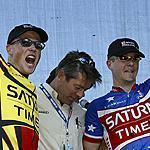 |
The name Tom Schuler has been around the sport of cycling for many years.
At age 15, Schuler hooked up with the Wolverine Sports Club in Detroit:
a city with a particularly strong Belgian and Italian community and a
club that groomed a particularly long list of champions, including Frankie
Andreu, Jeff Pierce, two-time world champion Sue Novara-Reber, and four-time
world champion and Olympic bronze medalist Connie Paraskevin-Young. Schuler
rode for the national team for a number of years, representing his country
at the 1976 and 1980 Olympic Games and rode as a pro for 11 years, before
creating Team Sports Inc. in 1991.
“ I
am very optimistic. Cycling is much easier to talk about now than
it was 10 years ago. ”
|
"So I was a cyclist first and then a team director," says the charismatic
Schuler. "Being an entrepreneur involves a certain amount of risk-taking
that I really like, just as cycling does. I have a great job; it has its
ups and downs, but it's exciting."
Cyclingnews: What were your goals when you began Team Sports and
how did you get involved with Saturn?
Tom Schuler: Team Sports was initially a rollerblade racing team.
I had been working as an assistant to Jim Ochowicz with the Motorola cycling
team in the early 90s when I decided to start Team Sports. The rollerblade
team then became an X-Games team and we had put together a MTB team when
Saturn got hold of me. They had heard what I was doing and wanted to be
involved. Over the years, we have managed six or seven teams, but the
Saturn cycling team has been the steadiest. We had a mission on behalf
of Saturn to promote their product and we had specific goals and very
definite plans.
CN: Saturn has been one of the biggest teams on the US racing
scene for quite some time. In your opinion, what has team Saturn done
for the sport of cycling in this country?
TS: I believe that teams like Saturn have helped establish a level of
professionalism for the sport. There is a standard that we agreed on and
we have been fairly steadily developing that. Saturn has made an impact
and left a legacy.
CN: Why do you think Saturn pulled out of the sponsorship after the team
after the men's team especially had one of the best years ever - a year
Mike Sayers of Health Net has called 'The year of Team Saturn'?
TS: I think every sponsorship runs its course and Saturn needed to move
in a new direction to reach a new audience. The cycling audience is still
a good one for them and the decision was very hard for them because they
knew the program was so effective, but they have been reaching this same
audience for 12 years now. Since last week when they made their decision,
they have been very helpful and instrumental in helping us find new sponsors
by demonstrating how effective the program really was for them.
CN: How do you see the state of cycling in the US for next year when
at this point it looks like we are losing three of the major men's teams
and two major women's teams?
“ On
the grand scale of things, the loss of a team or two is not going
to affect the sport. Teams will come back and sponsoring a team
or an event will remain to be a viable strategy for business.
”
|
TS: Losing teams along the way is the way it goes. It's like we have
taken four steps forward and now we are taking two steps back. But road
cycling is not going to be a flash in the pan. There have been a proliferation
of men's teams and a steady growth of women's teams in the past few years,
and generally when you lose a team a new one comes along eventually.
I still see a lot of people relating to the sport of cycling. It's something
you can do for fun and relaxation or something you can take very seriously.
It is a great sport and a lot of companies are still using cycling as
an image to promote their product. I am very optimistic. Cycling is much
easier to talk about now than it was 10 years ago. There is no question
that Lance Armstrong has had a lot to do with that. Certainly, when you
have Lance in the spotlight in the mainstream media all the time, it creates
an incredible awareness of the sport. But it's not just Lance, it's the
building blocks that are around to develop great cyclists.
On the grand scale of things, the loss of a team or two is not going
to affect the sport. Teams will come back and sponsoring a team or an
event will remain to be a viable strategy for business. If you look at
four of the biggest races in America right now, they have all started
in the last year or two. T-Mobile International, New York, Tour de Georgia
and now Vail all prove that this sport is still thriving. In saying that,
it would be great to see more American companies use cycling at a platform.
CN: What are your goals for Team Sports now that Saturn has ended its
sponsorship?
TS: Our goal is now to stay in this business. It's a great business!
We still have our Timex multisport team running and we are working feverishly
with companies so that they may take advantage of the product we have
available here with our cycling team. We have a lot of leads that we are
working on and potential partners who are very interested and have expressed
their surprise on what they can gain from this program for such a small
cost. The aim now is to close the gap between positive statements like
that and an official deal. It's satisfying that there has been so much
interest. It's been a week now and the phone has been ringing non-stop.
As for the athletes, I have told them they are free to look around because
I don't want them to miss an opportunity and I don't expect them to wait.
At the moment though, with a couple of other teams pulling out, there
are a lot of athletes out there and fewer jobs.
The good news is that we have the basic foundation of a very strong team
to offer. We also have something very unique and that is that our team
has both a very strong men and women's side to it.
CN: There have now been two extremely challenging moments in your time
as director of Team Sports, the first being the death of Nicole [Reinhart]
and now the loss of your title sponsor; what were some of the happier
times with this team?
TS: There are two parts to the satisfaction of running a team. One is
when we help an athlete achieve their goals. In some cases, this has been
helping guys get into division one teams and move forward with their careers
in cycling; for others, it has been to achieve their goals in the US.
Mark McCormack is a good example of that. Mark has been with us for many
years, and this year he finally achieved perhaps his biggest goal when
he became USPRO champion. Then we had riders like Chris Horner, who had
been getting great results for many years. We were able to create a situation
for him where he had a strong team behind him, all of whom were eager
to help him. Other examples are athletes like Freddy Rodriguez, Tom Danielson
and Levi Leipheimer, who all moved on to division one teams after riding
with Saturn. In fact, 13 athletes have moved from Saturn into division
one teams over the years.
There has been a lot of success along the way with the women's team.
In 2001 and 2002 we had a stated objective to be the best team in the
world and we achieved that. I think the Saturn team became a benchmark
that people wanted to equal.
Great days
Photo: © Doug Sheppard
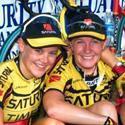 |
The second source of satisfaction is that you can help the sponsor achieve
their goals. Not only the primary sponsor, but all the sponsors like the
bike and wheel sponsors. Helping Saturn achieve their goals work s both
ways. Saturn sponsored charity events and bike racing right down to the
local race scene. They ended up really localizing their involvement this
way, and the individual Saturn dealerships supported cycling in their
areas because it helped their individual sales.
More Cylingnews features
|
What the riders say
We spoke to Saturn riders past and present about the influence
the team had on their careers and the legacy it leaves. Here's what
they had to say.
One of many wins
Photo: © Rob karman
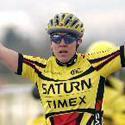 |
Ina Teutenberg (Saturn rider 2001-03): With the long sponsorship,
Saturn has been part of developing US cycling in the last couple
of years and making it more competitive. The team has been developing
a lot of talented riders who have moved on to big European teams
or to US Postal, and it has always had had a women's program which
has given women the chance to be professionals. American cycling
will suffer, and a lot of guys will not find a job next year with
all the teams disappearing. Racing will not be as competitive with
so few teams around.
I came to the team in 2001 and the first two years were just an
amazing experience with the group of girls we had. We were the number
one team in the world and the willingness of the girls getting it
together was something new for me. Otherwise the whole organization
is good and something new for most of the female riders to work
in such a professional environment.
USPRO victory
Photo: © Jon Devich
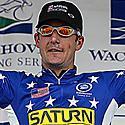 |
Mark McCormack (Saturn rider 1996 - 2003): I feel [Saturn's]
association with Team Sports had set the standard for US cycling
teams to emulate. Because Saturn worked so closely with its retailers,
Team Sports, and all the associate sponsors is why it lasted so
long. Not only has Saturn set the bar for other teams but also for
other event sponsors. From my perspective, Saturn's involvement
is a big reason why racing in the US has become so competitive.
Team Saturn holds eight great years of my life. I have had the
opportunity to race in the same jersey as Steve Bauer, Norm Alvis,
Frank McCormack, Bart Bowen, Brian Walton, Trent Klasna, Chris Horner,
Tom Danielson, and so many others who are on their way to great
careers. I have traveled the world and experienced so many great
things. I will miss having Saturn in this sport. I appreciate everything
that Saturn has provided, especially getting a free car every year.
Comeback
Photo: © Jon Devich
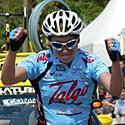 |
Dede Demet-Barry (T-Mobile, Saturn rider 1995-2000): In
sponsoring an elite level women's team in the US, Saturn has raised
the level of women's cycling in America and perhaps worldwide. They
have provided support which has enabled more women to focus their
full energy on training and competing. They have done an excellent
job of marketing the sport not only through the support of the team,
but also through event sponsorship. They have raised cycling awareness
in the United States.
It looks as if cycling in America is suffering the effects of the
global recession. Unfortunately, when there is a shortage of money,
companies often cut their marketing budgets. Cycling is experiencing
some lean times in financial terms and this means there will be
fewer professionals next year. It is unfortunate, but hopefully
it will be a short-lived phase and new sponsors will appear soon.
My years on Saturn were filled with ups and downs. The highlights
being the hundreds of races we won as a team and the low point being
the death of Nicole Reinhart in 2000. I am thankful for the opportunity
I had to make a living doing what I love to do, to have the freedom
to pursue my goals and to see new places, experience different cultures
and meet new people each week while racing. Thanks guys for all
the opportunities.
Versatile
Photo: © Zui Hanafusa
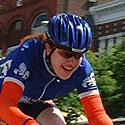 |
Clara Hughes (Saturn rider 1995 - 2001): I was on the team
for seven years and saw it go from being a men's team with a few
token women to being a program that placed a great importance on
women's racing. Rene Wenzel truly advanced women's cycling as a
whole through us, by treating us as professionals and teaching us
how to race and win as a team.
I will never forget the first lead-out we did, it was the criterium
in Visalia in 1995. Rene gave us the plan for the final two laps
and asked us if we knew how hard we had to go to successfully lead
our sprinter out at the time, who was Jeanie Golay. He said "you
have to go so hard that when you pull off you get dropped you are
so tired." We did and Jeanie won. I remember the Saturn guys who
were watching as they prepared for their race. They all congratulated
us, saying they had never seen women race like that, it was so cool!
That was only the beginning and I feel that because we were treated
as pros we raced like pros, like a team, and the other women teams
had to become more professional to match us. It added so much to
the development of women's cycling. It is sad to see Saturn pull
out and I hope for the sport someone comes in to fill the void.
It is going to be a rough period for USA cycling if another major
title sponsor does not come in.
Also for me Tom Schuler supported me not only through two summer
Olympics, but a winter Olympics as well after I switched back to
speed skating in 2000. I can say that Team Sports directly contributed
to my three bronze medals in winter and summer games. It is tough
to find sponsorship in Canada and rather ironic that a USA based
team was in many ways behind these achievements. Lucky for me!
Constant success
Photo: © Zui Hanafusa
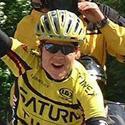 |
Anna Millward (Saturn rider 1999-2002): Saturn has been
an awesome force in US cycling and when I was there I remember it
being synonymous with cycling in the US. For many years is was the
dominant team in the US and set the standard. I am shocked to hear
how many sponsors are pulling out, especially since next year is
an Olympic year. It is certainly a step backwards for cycling in
the US. Team Saturn was a major highlight of my life. For two years
in a row, we were the number one women's team in the world and we
had amazing camaraderie in the team. It is very special to be part
of a group where every individual is highly elite and there is an
unspoken understanding in races of what needs to be done to achieve
victory. I think we'll all miss that feeling. I am very grateful
to everyone that put the team together and gave me the opportunity
to have four years I will never forget.
A decade on
Photo: © john Musselman
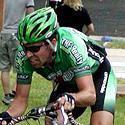 |
John Lieswyn (7UP-Maxxis, Saturn rider in 1992): Saturn
has been a huge benefactor to the sport. I think [Saturn] have gotten
far more exposure through cycling and especially their big wins
in NYC 2002 and SFO 2003 than they would have gotten through other
so-called traditional forms of media.
It is tempting to see the demise of Saturn and the rumors of other
teams going away as an indictment of the sport, but every sponsorship
has its lifecycle. As in the case of Coors and Shaklee, the point
of diminishing returns is eventually found. The tough economy is
definitely having an impact, but there are several new teams in
the works so let's all keep our chins up!
Marked woman
Photo: © Jon Devich
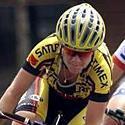 |
Suzanne Sonye (Saturn rider 2000-02): I think the fact that
Saturn supported a cycling team for 12 years is amazing. I believe
it helped the sport in the US a great deal. The state of cycling
will be in a bad way if other sponsors are not obtained. Women's
cycling is taking a hard hit in the US year after year, and this
year will be one of the worse if there are no new sponsors coming
in. What has made US racing amazing in the past is the Euro influence
here - we are losing that completely.
Being a member of the Saturn Cycling team for three years made
a huge impact on my life and changed the direction I was going.
I experienced some of the most significant things on this team.
I was lucky enough to be a part of the most amazing women's team.
I had the opportunity to spend some of the most meaningful moments
of my life with Nicole Reinhart... being on Saturn gave me the opportunity
to meet some amazing people that I would have never known had I
chosen another path. It hasn't always been easy, but it was worth
it.
|
|










